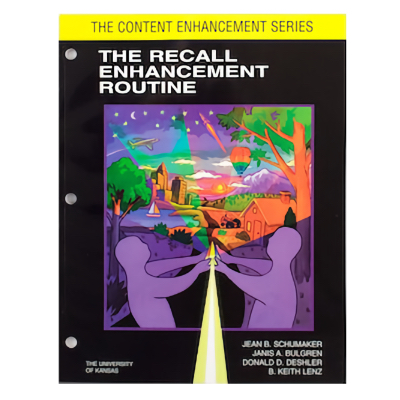The Recall Enhancement Routine

Teachers use the Recall Enhancement Routine to show students how to create and use a range of mnemonic devices to remember information and study for tests. These include visual memory devices, keyword devices, and association, acronyms and rhymes.
Students whose teachers used the Recall Enhancement Routine had significantly higher overall posttest scores compared to pretest scores than students in the comparison group. Students in the experimental group created appropriate devices needed to recall information for 42% of the test items whereas those in the control group the number was 24.7% in 7th grade life science classrooms.
Author(s):Jean B. Schumaker, Janis A. Bulgren, Donald D. Deshler, and B. Keith Lenz
Publication and Purchasing Information: University of Kansas, Center for Research on Learning / KU CRL Online Store
Resources:
The Recall Enhancement Routine Research (.pdf)
Research Articles:
- Bulgren, J.A., Deshler, D.D., & Schumaker, J.B. (1997). Use of a recall enhancement routine and strategies in inclusive secondary classes. Learning Disabilities Research & Practice, 12(4), 198-208. A multiple-baseline design study is used with teachers to determine the effects of training on their performance of the Recall Enhancement Routine and a post-test only comparison design is employed to determine the effects of teacher use of the routine on student use of mnemonic devices.
- Bulgren, J.A., Schumaker, J.B., & Deshler, D.D. (1994). The effects of a recall enhancement routine on the test performance of secondary students with and without learning disabilities. Learning Disabilities Research & Practice, 9(1), 2-11. Multiple measures are collected and analyzed using descriptive and inferential statistics to evaluate the effectiveness of repetitious review of the Recall Enhancement Routine on student performance (LD and non-LD) in inclusive general education classrooms.
The Story Behind the Recall Enhancement Routine from author Jean Schumaker:
During our research in secondary schools, our research team determined that a large percentage of a student’s quarterly grade is based on test scores. We also determined that secondary tests in required subject-area courses require students to learn between 60 and 80 facts to prepare for each test. We reasoned that teachers could present factual information to students in a way that would make the information more memorable for students while also modeling for students a variety of ways that students could use to make information memorable for themselves. The Recall Enhancement Routine was designed based on this reasoning. Through the use of this routine, teachers model the use of a variety of memory tools while they are presenting information to students.
Author's Thoughts about Content Enhancement:
Content Enhancement instruction is one of the few instructional methods that have been shown to be effective through empirical research to produce improvement in the learning and academic performance of at-risk students. Research on the Content Enhancement Routines has consistently shown that the performance of all types of students, including high achievers, normal achievers, low achievers, and students with disabilities, improves when teachers use the routines. The purpose of all the routines is to make instruction in subject-area courses more “learner friendly.” As a result, students are more able to learn and remember the information in their courses.
Teacher and Student Feedback on the Recall Enhancement Routine:
This routine and the other Content Enhancement Routines have been readily adopted by thousands of teachers across the nation. When teachers use this routine, not only do students earn higher scores on their unit tests, they also learn memory tools that they can use to study for tests on their own.
This manual is available through the KU CRL Shop.
Please note that professional development, coaching, and infrastructure support are essential components to effective implementation of SIM instructional tools and interventions. It is highly recommended that you work with a SIM professional developer. See the SIM Event list for sessions or email simpd@ku.edu to learn more.
An accessible version of the documents on this site will be made available upon request. Please contact the KU CRL Professional Development Research Institute, at simpd@ku.edu to request the document be made available in an accessible format.